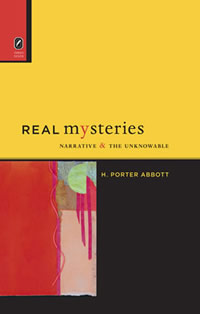Real MysteriesNarrative and the UnknowableH. Porter AbbottTheory and Interpretation of Narrative |
 11/26/2013 Literary Criticism/ 178 pp. 6x9  $60.95 cloth 978-0-8142-1232-5 Add cloth to shopping cart $21.95 paper 978-0-8142-5274-1 Add paper to shopping cart $14.95 Kindle 978-0-8142-7003-5 Add Kindle to shopping cart Shopping Cart Instructions Review/Change Shopping Cart & Check-out | |||
|
Explore More |
“One of the unique strengths of Abbott’s book is how, without fanfare, it succeeds in integrating narrative theory, cognitive approaches to literature, and literary interpretation—a feat considered impossible by some of the critics of literary cognitivism . . . . The path Abbott carves through these approaches is elegant and original, and his book is likely to appeal to literary scholars well beyond his ‘home fields’ of narrative theory and cognitive literary studies.” — Marco Caracciolo, University of Freiburg The influential and widely respected narrative theorist, H. Porter Abbott, breaks new ground in Real Mysteries: Narrative and the Unknowable. In it, he revisits the ancient theme of what we cannot know about ourselves and others. But in a sharp departure, he shifts the focus from the representation of this theme to the ways narrative can be manipulated to immerse “the willing reader” in the actual experience of unknowing. As he shows, this difficult and risky art, which was practiced so inventively by Samuel Beckett, was also practiced by other modern writers. Abbott demonstrates their surprising diversity in texts by Beckett, Gabriel García Márquez, Herman Melville, Toni Morrison, Alice Munro, J. M. Coetzee, Tim O’Brien, Kathryn Harrison, and Jeanette Winterson, together with supporting roles by J. G. Ballard, Gertrude Stein, Michael Haneke, and Pseudo-Dionysius the Areopagite. The demands of this art bear directly on key issues of narrative inquiry, including the nature and limits of reader-resistant texts, the function of permanent narrative gaps, the relation between experiencing a text and its interpretation, the fraught issue of aligning grammatical and narrative syntax, the mixed blessing of our mind-reading capability, and the ethics of reading. Despite its challenges, this book has also been written with an eye to the general reader. In accessible language, Abbott shows how narrative fiction may create spaces in which our ignorance, when it is by its nature absolute, can be not only acknowledged but felt, and why this is important.
| |||


 H. Porter Abbott
H. Porter Abbott